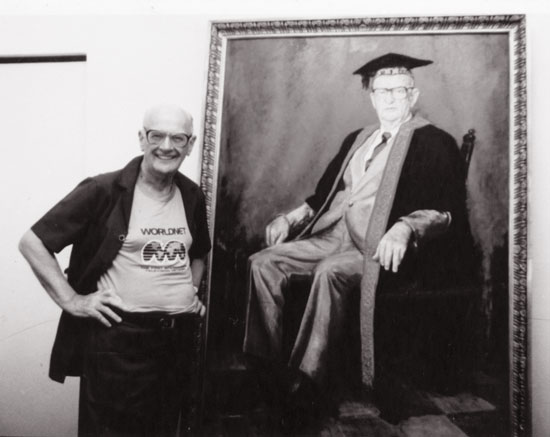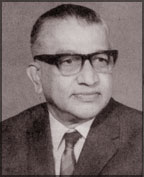|
H. R. Premaratne: The artist who built a space
station for 2001 :
Back to the future
by Nalaka Gunawardene
April 2008 marked the 40th anniversary of the release of classic
science fiction movie 2001: A Space Odyssey. The Academy of Motion
Picture Arts and Sciences - the entity that annually presents the Oscar
awards - held a commemorative screening on 25 April at Hollywood's MGM
theatre which was attended by astronaut Buzz Aldrin, actor Tom Hanks and
other heavyweights from the worlds of space travel and cinema.
Sir Arthur C Clarke, the co-creator of 2001 who died on March 19,
missed the occasion by just a few weeks. It was in May 1964 that
acclaimed film director Stanley Kubrick and author Arthur C Clarke
embarked on a creative collaboration: a novel and a screenplay inspired
by Clarke's 1950 short story "The Sentinel." (Contrary to a popular
belief, it was not a movie adaptation of an existing novel: both the
novel and movie were developed on parallel tracks, one feeding off the
other.)
|

Sir Arthur Clarke with official portrait painted by H.R
Premaratne |
In December 1965, many ideas, drafts, and titles later, the filming
commenced on 2001: A Space Odyssey. The futuristic epic, whose story was
placed in the opening year of the new millennium, premiered in the US in
April 1968 - and went on to become one of the finest science fiction
movies ever made. It is also frequently included in lists of all time
best movies in the entire history of the cinema.
As the Academy noted on its website: "With its epoch-spanning
storyline and its nearly dialogue-free script, 2001: A Space Odyssey
combined the production value of Hollywood film-making with the artistic
sensibility of European cinema.
Its cerebral approach to the genre helped usher in a new, more
literate age of science fiction cinema, and its extraordinary imagery -
the widescreen 70mm cinematography of Geoffrey Unsworth, the visually
dazzling and scrupulously researched production design, and especially
the Oscar-winning special effects - instantly became the benchmark by
which all space films would be judged."
Of course, the film's best known connection to Sri Lanka is that
Arthur C Clarke had by then settled down in the island. During the 1964
- 68 period that he was associated with the production, Clarke would
make periodic returns to his Colombo home - first from New York, where
he brainstormed story ideas with Kubrick for weeks, and then from
England, where the movie went into production.
Filming of 2001 began in December 1965 in Shepperton Studios in
Shepperton, England. Soon afterwards, it was moved to MGM's British
Studios in Borehamwood. (Stanley Kubrick, who by then had become
disillusioned with Hollywood, declined to make any more movies at a
US-based studio.)
|

H.R Premaratne |
The 40th anniversary coverage has triggered my memories of another,
much less known Sri Lankan connection with the film. The accomplished
Sri Lankan engineer, painter and sculptor H. R. (Hapugoda Rankothge)
Premaratne worked on the movie's special effects, all of which was
hand-made. (Not a single computer was involved in creating the movie,
which still awes movie-goers many of who take computer generated
imagery, or CGI, completely for granted today.)
I got to know Mr. Premaratne (affectionately known as Prema) in the
late 1980s when he was working as special assistant to Arthur Clarke.
In early 1987, I started working in Clarke's personal office in
Colombo as a research assistant to the author (This office is not to be
confused with the government-run technical institute named after him.)
I have just unearthed, from the depths of my archives, an illustrated
profile I wrote on Prema, which appeared in The Island on 26 January
1991. In a 2,000-word biographical sketch of the man that veteran
journalist D B Dhanapala once called 'a modern day Viswakarma', I
chronicled how Prema came to be associated with the movie's production.
Prema had retired in 1965 as Director of the Department of Public
Works - in other words, as the Ceylon government's chief builder. By
happy coincidence, 2001 was just entering its production stages around
this time, so Clarke put Prema in touch with the Borehamwood Studios
where elaborate sets for space scenes were being constructed.
There, for several months, Prema worked with British and American set
designers and special effects specialists.
The challenges they faced were enormous. Not having any computers or
other digital tools was just one of them. The Space Age was less than a
decade old, and humans had barely ventured out to Earth orbit - the Moon
landings still lay in the future. To envisage and then construct human
bases on the Moon and a spacecraft that would embark on a multi-month
mission to Jupiter certainly stretched the imagination of the entire
production crew.
For his efforts, Prema was listed as a member of the full production
crew - even though he would go uncredited in the movie itself (as did
dozens of others). When the Internet Movie Database was created decades
later at www.imdb.com, he would also earn himself an entry there as
Hapugoda Premaratne.
Harry Lange, chief designer of Hawke Films Limited who was in charge
of production designs, later wrote in a letter to Prema: "Not one model
could have been brought to the exceptionally high standard required in
this production without the skills and imagination of people like
yourself."
"Prema was a very skilled architect, his best known work being the
magnificent Independence Hall," Clarke recalled years later, in his
tribute to Prema upon the latter's death in the early 1990s. "During his
stay in England in the mid 1960s, I put him in touch with Stanley
Kubrick, who was then making 2001: A Space Odyssey. Prema's expertise in
art and engineering was very valuable in the production of the movie's
special effects, and he assisted in the building of the spectacular
space station."
Prema capped his long and illustrious public service as Sri Lanka's
ambassador to Burma, concurrently accredited to Thailand, Laos and
Singapore (1974-78). From 1983, he worked as Clarke's special assistant,
while pursuing his own painting, sculpture and design work from his home
at Wijerama Mawatha, Colombo - a short walk from Clarke's own residence
at Barnes Place.
I remember visiting Prema at home on several occasions. After his
wife passed away and son moved overseas, he lived alone in a large, old
house that was teeming with works of art - it was like a private art
gallery or museum.
All over the garden, there were scaled replicas of famous rock
sculptures from places like Anuradhapura and Polonnaruwa.
He pioneered a method of creating fibre glass replicas of
archaeologically valuable statues and artefacts. These were used to
showcase the best of Sri Lanka in major exhibitions in London,
Washington DC and other capitals of the world in the 1980s.
In the late 1980s, Prema also painted a life-size portrait Arthur C
Clarke as Chancellor of the University of Moratuwa, which is still on
display there.
It's a bit cliched to say this, but they don't make renaissance men
like H. R. Premaratne anymore. He straddled the arts and sciences with
equal dexterity and with impressive results in both spheres.
He not only built bridges in newly independent Ceylon, but was
himself a bridge between the 'Two Cultures' of the sciences and
humanities that British physicist and novelist C P Snow wrote about.
Just like his friend Arthur C Clarke was...
[Adapted from the blog of Nalaka Gunawardene, located at
http://movingimages.wordpress.com/] |
